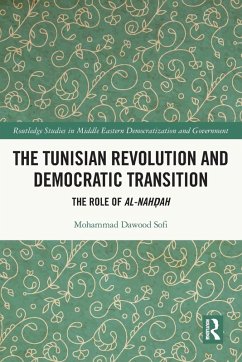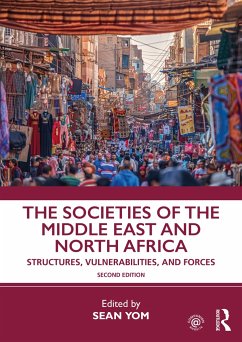
Tunisia and Egypt after the Arab Spring
Party Politics in Transitions from Authoritarian Rule
Versandkostenfrei!
Versandfertig in 6-10 Tagen
144,99 €
inkl. MwSt.
Weitere Ausgaben:

PAYBACK Punkte
72 °P sammeln!
This book examines the processes of transition from authoritarian rule in Tunisia and Egypt between 2011 and 2014, arguing that differences between the two countries can be explained by the conduct of their respective political parties.Drawing on a new conceptualization of political parties' agency that considers their unique nature as intermediate and intermediary institutions, the book allows for the identification of those factors driving political parties' choices in processes of transition. Moreover, thanks to the employment of quantitative text analysis on the electoral manifestos of the...
This book examines the processes of transition from authoritarian rule in Tunisia and Egypt between 2011 and 2014, arguing that differences between the two countries can be explained by the conduct of their respective political parties.
Drawing on a new conceptualization of political parties' agency that considers their unique nature as intermediate and intermediary institutions, the book allows for the identification of those factors driving political parties' choices in processes of transition. Moreover, thanks to the employment of quantitative text analysis on the electoral manifestos of the parties involved, this work presents new data for the study of party systems in Tunisia and Egypt. Presenting a new toolkit for analysis, Tunisia and Egypt after the Arab Spring ultimately reveals how differing legacies of authoritarian repression across the two countries can help explain why the Tunisian transition culminated with the 2014 democratic constitution, and the Egyptian transition with the 2013 military coup.
Conceptually, the book will appeal to those working in comparative politics and those interested in processes of democratization and authoritarian resilience. Nonetheless, the focus on Tunisia and Egypt makes the book suitable reading for anyone interested in Arab politics and the MENA region generally.
Drawing on a new conceptualization of political parties' agency that considers their unique nature as intermediate and intermediary institutions, the book allows for the identification of those factors driving political parties' choices in processes of transition. Moreover, thanks to the employment of quantitative text analysis on the electoral manifestos of the parties involved, this work presents new data for the study of party systems in Tunisia and Egypt. Presenting a new toolkit for analysis, Tunisia and Egypt after the Arab Spring ultimately reveals how differing legacies of authoritarian repression across the two countries can help explain why the Tunisian transition culminated with the 2014 democratic constitution, and the Egyptian transition with the 2013 military coup.
Conceptually, the book will appeal to those working in comparative politics and those interested in processes of democratization and authoritarian resilience. Nonetheless, the focus on Tunisia and Egypt makes the book suitable reading for anyone interested in Arab politics and the MENA region generally.













